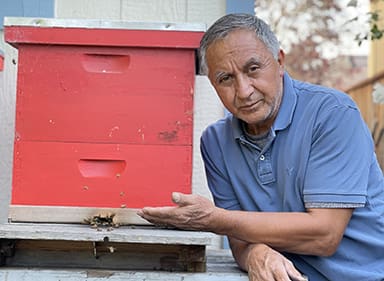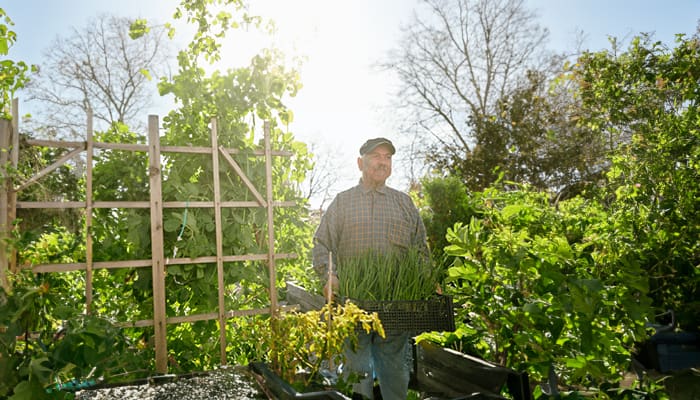August 15, 2022
Friends House Staff Member Miguel Giron Has a Hobby to Buzz About
At Friends House senior living community in Santa Rosa, residents are environmentally conscience and believe in preservation and sustainability. Those values are also held by many staff, including longtime employee Miguel Giron, who is doing his part for the environment thanks to his hobby that receives plenty of “buzz” around the community.

As a boy living with his family on a farm in Guatemala, Miguel remembers intently observing his father, an amateur beekeeper, watch his hive for hours.
“I did not understand his fascination with bees until I started taking care of my first hive,” said Miguel, a facility services supervisor at the community for nearly three decaes. “I then realized how fascinating bees are. Watching their behavior is like watching my children at the playground. It brings me so much satisfaction.”
Among his nine siblings, Miguel is the only one who followed in his father’s footsteps to embrace the hobby and become his family’s next generation of “bee whisperer.” His father taught him all he knows – not only what to do but also what not to do when it comes to bees.
“I think my first lesson was the time my father asked me to move one of the hives,” Miguel said with a grin. “He told me exactly what to do but I did not follow his instructions. The bees all left the hive and swarmed me. I had bees all over my body and head. I had to wash them away with water. Miraculously, I only got stung once.”
The art and science of beekeeping has changed since his father taught Miguel this centuries-old craft more than 50 years ago. “My father made his own protective suit and helmet and built his own wooden hives from scrap wood,” he said.
These days, hives are available commercially at farm and ranch supply stores, online or at specialty beekeeping shops. They are composed of a queen and bees that have been collected from the wild, split from another hive or marketed as a package or nucleus.
A nucleus looks like a tote with wooden frames on which the bees draw comb. These cells of wax store everything they need to survive, including pollen, eggs, the larvae or brood and honey.
When building a hive from scratch, Miguel said it’s important to allow enough space for bees to move around but not too much that they begin building comb in unwanted areas. The first level of the hive, the brood box, houses the queen, her army of worker bees and male drones whose primary purpose is to breed. Worker bees live at least 28 days, and queens can live up two years or more.
“My dad never sold the honey, he just gave it away to his friends and family,” Miguel said. “I remember on holidays, like Easter, friends and family would come by excited to get honey. He liked to see the smiles on their faces when they received it. I sometimes give the honey from my hives to my friends, and of course to Friends House residents. I get the same smiles as my dad got. But I have to be careful not to harvest too much. How much honey you take is matter of conscience. Honey is the bees’ only food source. I have to leave enough for them. But I’m really not in it for the honey. I’m more interested in perpetuating the bee population and the surrounding environment they pollinate.”
Miguel currently maintains five hives at his Santa Rosa home, each of which he estimates contain at least 1,000 bees.
A single bee colony can pollinate 300 million flowers each day. Grains, like wheat and rye, are primarily pollinated by the wind, but fruits, nuts and vegetables are pollinated by bees. Seventy out of the top 100 human food crops — which supply about 90 percent of the world’s nutrition — are pollinated by bees.
Miguel says there are plenty of fascinating facts about bees: Bees thrive in temperate weather. It can’t be too cold or too hot, which is the perfect climate in Santa Rosa. Bees who belong to different hives rarely if never interact. Bees can identify if a bee from another hive has infiltrated its hive (many do so to steal honey). “Soldiers” are tasked with killing intruders or driving them out. Bees also need plenty of pollination sources to survive and to help humans survive.
“I think the biggest myth about honey bees is that they are aggressive,” Miguel said. “People tend to lump similar insects together. Wasps, yellow jackets and hornets can be aggressive and attack with little provocation, but the common honey bee is basically docile. If you leave them alone they will leave you alone. The worst thing you can do if you encounter a bee is to swat at it. Instead, just stand still and slowly move away.”
During his 26 years at Friends House, Miguel has educated dozens of residents about bees who have come to appreciate them and Miguel’s special knowledge.
“He knows his stuff,” said one resident. “We love Miguel. His work is along the lines of our philosophy at Friends House – preservation and sustainability.”
And what about passing on his hobby to his children? “I have four children and only my daughter was interested in beekeeping when she was young,” Miguel said. “But now she’s married and busy with her family. We’ll see if one day she catches the beekeeping bug again.”






